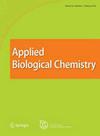芍药根甲醇提取物及其乙酸乙酯组分对缺血再灌注大鼠心脑损伤有减弱作用
Journal of the Korean Society for Applied Biological Chemistry
Pub Date : 2011-10-01
DOI:10.3839/JKSABC.2011.121
引用次数: 3
摘要
芍药根甲醇提取物及其乙酸乙酯部位对缺血再灌注大鼠心脑损伤有明显的减轻作用。因此,食用已被批准为食品的牡丹根对预防冠状动脉闭塞引起的心肌梗塞和脑梗塞有好处。本文章由计算机程序翻译,如有差异,请以英文原文为准。
Methanol extract of peony root (Peonia lactiflora) and its ethyl acetate fraction attenuate heart and brain injury in a rat model of ischemia-reperfusion
Methanol extract and its ethyl acetate fraction of peony root (Peonia lactiflora) were found to attenuate heart and brain injury in a rat model of ischemia-reperfusion. Thus, intake of peony root already approved for food in Korea could be beneficial for preventing myocardial and cerebral infarction caused by occlusion of coronary and cerebral arteries, respectively.
求助全文
通过发布文献求助,成功后即可免费获取论文全文。
去求助
来源期刊

Journal of the Korean Society for Applied Biological Chemistry
FOOD SCIENCE & TECHNOLOGY-FOOD SCIENCE & TECHNOLOGY
自引率
0.00%
发文量
0
审稿时长
4-8 weeks
 求助内容:
求助内容: 应助结果提醒方式:
应助结果提醒方式:


